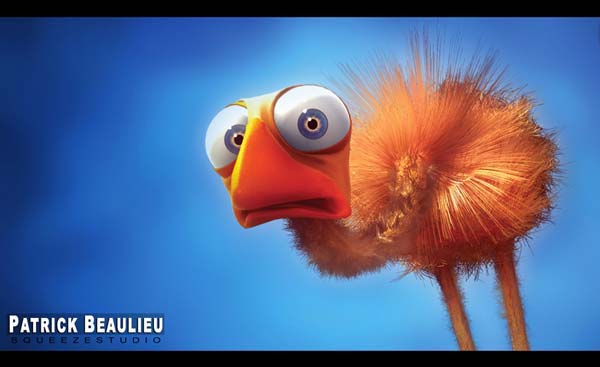

Video Game Animator
Special thanks to Patrick Beaulieu for taking time out of his busy schedule to talk about his work as Lead Animator for video game company Ubisoft.
Lead Video Game Animator
// Patrick Beaulieu
Are you a self-taught artist or are you formally trained?
Well, I have a basic education in 3D. What regards animation, I learned from my passed experiences as I went along in my work and also I met a lot of talented people, who taught me a lot. I try to be an artist that is constantly up to date, so I stay in touch with the innovation by going on the internet. I also make a few animations so I can continue to better myself

Starting in the 3D field was a header for me I didn't know a thing about computers, all I knew to do was drawing, so I decided to take a one year 3D course in Quebec City. What really helped me to decide to go into animation is when I started to work in a small video company, after I finished school; I met a 2D animator with a lot of talent by the name of Michel Falardeau. I learn a lot from Michel, I was a beginner with little knowledge in animation and he taught me to love it. He opened my eyes to all the possibilities I had. I was immediately hooked. This is how I started to be an animator and I still love it as much as when I started.
When you made the decision to be an animator what was the first step you took to make your dream a reality?
Becoming an animator was a bit of an accident. With my first job I was assigned as an animator without having any experience in the field, so, I learned what animation was and I developed a liking for it and now, I wouldn't do without it.
Could you tell us about your experience attending Institute Athena Animation School?
My education went quickly enough. I learned the bases of 3D at Institute Athena. The course was based on 3D Studio Max 3, with a few courses of Flash, Photoshop and Combustion. I liked my experience there because I learned a lot of tricks of the trade. The only thing I regret is not being better supported artistically. It's been 6 years since my passing there so I guess a lot has changed in this course. With my education, I was able to find a job the first day after I finished school and since then I've continued to advance in my field. I'm really happy with the way thing have worked out since school. The school's mandate was for us to create a demo telling a small story while showing modeling, texture, lighting and animation. My demo result was good but the story was so so, from what they told me. ?
What type of classes did you take while studying to become an animator?
My education was not focused on animation so I learned in the work field. Being placed animator without experience, forced me to learn quickly. I bought the Richard Williams animator's bible, Ed Hook books on acting and all the existing books on animation. I even went on the internet for tutorial with animators like Keith Lango's the one on pose to pose It was really helpful for me I also got résumé's of master class in all sorts of animations. I got as much knowledge as possible to become better, to have better knowledge and a better approach on animation. I'm always looking for new information so I can stay up-dated, because the possibilities are so vast that an animator can't know it all. I'm in constant search of information on the new stuff a good animator should know. I love to read interviews with other animators so I can study their methods of working and the way they have of approaching different shots of animation. All animators have their own techniques.
Do you think animators with formal training have an advantage over self taught animators?
I think learning with someone has its advantages. When I first started, it happened often that I didn't know how to do certain things to improve my shots. I knew that something wasn't right, that made me loose a lot of time just trying to find what was wrong I had a lot of trial and error to find the problem. Being in constant supervision by an experienced teacher or another person is a must. You are guided and enlighten on certain things that you should and should not do. The fact that you are self learners does not keep you from becoming an animator but you have to work harder and longer to achieve your goals. In the end you just have to be passionate, hard working and enjoy the profession you've chosen.

My first job was a teacher in a video game company, I was a course given by the company to train students in the company how to make 3D. I was in charge of eleven people and responsible of their education. At the same time I was managing the 3D department giving out assignments for the animations to be done. It was pretty rough for a first experience, a lot of over time and sleepless nights. I stayed there two years, until the company was almost bankrupt, that's the reason I left. But I learned a lot over there. There's nothing like a demanding small company that gives a lot of responsibility so you can learn.
You've worked as Lead Animator for Ubisoft, what are some of the video games you've worked on and what was your role on the title?
I worked on Open Season as an Animator, on Rainbox Six Vegas as an Animator and Surf's Up as Lead Animator. Today I'm working on a really interesting project; unfortunately, I can't talk about it yet. ?
How did you get your job at Ubisoft?
After spending two years at Hybrid, I heard that Ubisoft was coming to Quebec City, the city where I grew up, I immediately applied and a few weeks later I was moving back.
What are the daily duties of a Lead Animator?
The duties of a Lead Animator are diversified. First, there is a lot of management tasks, especially at the beginning of a project I have to build the assets lists for the animations necessary for the game. I have to schedule all that will be done and who will do what. Secondly, there is all the animation support I help the animators to better themselves to push them to there full potential. I also give them pointers and I make sure that the style is constant. A big part of the job for a Lead Animator is formation. There is also the technical part of the job, I have to find the method we will use for the animate all the materials such as what controller I want for the rigs and all that we'll need for the production. Thirdly, there are the meetings. It's a portion of the job that requires a lot of time because you are always disturbed for this and that but it' s normal it comes with the job. Seriously tough, meetings take a lot of time but are necessary and time goes by quickly. Finally, but not the least my job as an animator. Yes, I still love it as much. I save the good animations for me to keep me up to date. I love to animate and what a better way to spend a day than by moving characters all day, even a child could do it. It's a lot of fun.
Do you have any creative freedom on your projects at Ubisoft or is everything already mapped out for you?
Big parts of the projects have guide lines to follow but there's a lot of room for creativity and innovation.
What advise would you give to our readers who want to work for a video game companies what can they expect? What should they not expect?
Animator is a job that a lot of people think working for a video game company is a synonym of playing video games all day, unfortunately, it's not the case, the only people allowed to play are the game testers by playing the same maps about 300 times. It's not as much fun as playing at home. Being an animator on video games is hard work and not a game. It's a passionate field and implies that you be a social person. Making a video game implies that a lot of people must work together, the game designer, programmers, level designers, 3D artists etc.A video game is big team work. Working at Ubisoft, is very pleasant and we are well treated even if it's a big company. There are always Happy Hours organised for birthdays, game premiers and other activities. Working on a game is very demanding certain projects require overtime. I've been lucky so far, all my projects have all gone well. In general I'm telling you to work hard and come work on a video game you'll have a ball.
You've worked for Hybride Technologies as a 3D Animator can you tell us about the projects you've worked on while working for Hybride Technologies?
Here is a list of films I worked on at Hybride Technologies: Sin City 2005 / Animator 3D , The Adventure of Shark Boy and Lava Girl/ Animator, Racing Stripes 2005 / Animator 3D, Sky Captain and the world of Tomorrow 2004 / Roto, Snakes on a Plane (2006) / Animator (Layout), 10.5 : Apocalypse (TV) / Animator Aurore l'Enfant Martyre 2005 / 3D Animator.

Animation clip ( werewolf 1 )
This project demanded a lot of work; the realistic animation was a lot of work. Gabriel made the modeling, the displacement maps, rigs and a part of the weighting. I did the other part of the weighting, the animation which required a lot of research development and I did the tests.
Animation clip (werewolf 2)
You've worked on some major motion pictures which film was the most fun to work on and why?
I worked two years in the film industry. It was a good experience for me, I adored making SFX. My biggest work load was on Racing Stripes. I made a lot of animations in this film. I worked on about 100 shots of the film doing mostly animal lip-syncs (Stripes, Tucker and Baby Stripes). I also animated a few shots of the flies, Buzz and Scuzz.I liked working on this film because it was my first experience in the field of cinemas everything was new for me I learned to know the team, to make real facial animations. Rests assure I can make a mean face muscle. The approbation for the lip sync shots were really severe so I had to put in a lot of hours on quality and fluid movements to make everything look real.
How were you hired to work at Hybride Technologies?
I was in Quebec City at the time I just applied for a job at Hybrid and a week later I sent my resume, containing all the personal stuff I had done. I was contacted for a six month contract. Finally they took me in full time and I stayed there about two years. In the beginning, I taught it would be impossible to get into a company of that nature because I wasn't very confidant in my aptitudes. I gained it all after that. I learned a lot over there, I got a chance to work on films and to be working with a great team full of talent. It's an experience I'll never forget. The way Hybrid treated their staff was remarkable. Everyday we would have a look at all the shots in the movie theatre on giant screens, we had a caterer to cook for us, we had ski passes and spa passes etc. It was the big lifestyle.
What is the difference between animating for video games and animating for motion pictures?
The difference between the two is the quality of the animation, for movies, the quality is one thing but the most important thing is the production times which are not very long so the animation and the final product are more interesting. If an animation shot is not well coordinated or doesn't' work properly, we have to redo it to obtain the best ones. In video games, the quality is as interesting but less than in a movie. The delays are shorter and the number of animations to be done is not comparable. On video games we must act quickly and not much to work with. For control of the animation, it all depends on the console which you work with, and what the rigs look like. Concerning the details of facial animation, clothes, hair and all other smaller details, movies can not be compared to the video game.
Which do you prefer more the video game industry or the film industry?
For my part movies are more interesting as an animator without a doubted. Video games are interesting but they can't be compared. I decided to come back to Quebec City to just come back home. I like the region I live in now but work wise it' s a lot less developed than Montreal. Working in the film industry is more prestigious but video games are an easy way to get into companies. Making films or film animation is a job of a big caliber. Video games are more accessible but films are a summit.
What is the easiest way to break into the video game industry?
As an animator for video game or films, I believe you have to leave out the standard, be original in your animations and be very ambitious. Making your mark and leaving a good impression. You have to stay up to date with what is going on in the field regarding new software. If you have a passion for video games it will surely help but you don't have to be a game freak. Personally, I hardly play video games and it doesn't stop me from working in this field. If you have a will, confidence and are hardworking, a lot of good opportunities are there for you so that you can achieve your goals.
What are animation studios and video game companies looking for when hiring a animator?
They look for unpolished talent, it doesn't matter what software he/she uses what's important is can that person animate he/she will be a potential candidate. Concerning a portfolio, they like to see original animations avoid all clichés or movement that are often used or seen everywhere. Only put your best stuff in a demo, it's better to have three good animations than fifteen bad ones. Make a good selection of clips a bit of variety is always interesting for example cartoon, realistic, acting lip sync that is what an employer likes to see. When I interview potential candidates, these are some of the things I look for and I'm always surprised. ?
What are you currently working on?
I can't talk about what I'm working on at work it's still a secret for now but it's a really interesting project. Personally, I still make little characters. I also started to elaborate a small story and a few designs for a shot. I still good things to come. For more details, go to my website at www.squeezestudio.com. I keep it updated constantly.

I would like to continue my evolution as an animator, there is still certain types of animations I haven't tried or simply not done yet, like character acting I'd like to push it to a superior level, animate creatures and to try a bit more realistic stuff. I would like to make a demo containing a lot of acting in a small story. This is a project I want to realize by the end of the year. Not long ago, I gave an animation conference in Guadalajara. It was something I really enjoyed and that I will certainly do again. I also want to become a better teacher, presently I'm giving animation courses in college and I get a lot of pleasure doing it. All those things pose a good challenge for me.
Any closing words of wisdom for all the aspiring animators reading this interview?
First of all thank-you for this interview, it was an experience for me and I hope your readers will enjoy it. If I can give your readers a few tips it would be to be have perseverance, work hard on their animation lacunas, to be diversified, to accept critics it being good or bad, to post their animations on an animation forum in order to be critiqued to better themselves but most of all, to keep up to date in all that has to do with the 3D world, like read material that comes from around the world. But the best advice I can give future animators is work hard and be original.
If you have any questions concerning this interview or me, don't hesitate to contact me at sqeezestudio@hotmail.com I will be happy to answer your questions.
Thank-you very much
Patrick Beaulieu




